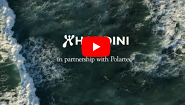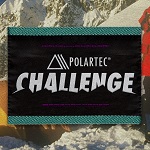Thanks A Billion! from Polartec on Vimeo.
As July sees Polartec Recycle its billionth bottle, we speak to the textile manufacturer about how this was made possible, how commercially beneficial it’s been and what it has planned for the future.
First steps
Polartec® has actually been busy recycling since 1993 initially embarking on the processing of plastic bottles. At the time, demand was low and technology was in its infancy resulting in scratchy fabric that felt recycled. Nevertheless the brand saw the relevance of recycled content for cutting edge outdoor wear and continued innovating, initially pushing through a programme of recycling Post Industrial Recycled waste or off-cuts which produced high quality fabrics that were used by many of its customers. Up until the end of 2009 – the brand had upped its recycled offering from one percent of total product to over 30 percent in four years, dramatically reducing carbon emissions and energy consumption. However, to increase its commitment to reducing waste further, Polartec had to take the next step.
The next BIG step: It wasn’t until 2010 when Polartec LLC hooked up with Unifi Inc, that the brand was able to make high quality recycled fleece using post consumer recycled content. Using REPREVE 100, Polartec was able to use a yarn using 100 percent clear plastic bottles that was undetectable in terms of quality from fabrics using virgin polyester.
Once Polartec had partnered up with Unifi, it was able to offer more styles in a wider range of colours, greatly expanding its portfolio. Roger Berrier, President & Chief Operating Officer at Unifi said: “In the past, limited technology presented many challenges in offering a high quality 100 percent post-consumer product. As technology has evolved, we are now able to offer a first quality, 100 percent post-consumer product in the right colours and styles that Polartec requires for its fabrics”.
Indeed it did and over the following five years Polartec gradually worked its way through one billion’s worth of clear plastic bottles that today contributes to over 60% of domestic product. One thing to note though, whilst product varies in terms of its recycled content, Polartec has made a corporate commitment to having a minimum of 50% recycled content in a style that is labelled as such.
Innovative adopters: Many International brands use Polartec® REPREVE 100 based fabric including The North Face, Patagonia, Montane, Mammut , Norrona and others in collections that utilise the fabrics from base layer to outer protection wear. The North Face uses recycled Polartec 300 for its best selling Denali fleece and Millet with its latest ROC Power Jacket. Some international customers have taken their responsibility for the environment one step further.
Norrona has been a big supporter of the Polartec recycled range for a number of years whilst Patagonia has a recycling relationship going back to the 90s. Patagonia was an early adopter; launching the first ever range of clothing using Polartec recycled content in 1993. The range, Synchilla, still offers jackets and vests. In addition, Patagonia has adopted Polartec recycled styles right across its collection including its popular Capilene 4-base layer range made of 50% recycled content. Patagonia, through its Common Threads Garment Recycling Program, will now accept any garment ever made of Polartec® fabrics to be recycled back into yarn and then new garments. This is the first closed-loop garment recycling program and all Polartec® fabrics qualify.
Why recycle? The reasons to recycle? Obviously, the impact to the environment tops the list. Recycling saves energy, reducing our reliance on non-renewable fossil fuels. It significantly reduces the amount of waste we put into landfills as well as harmful emissions deposited into the atmosphere. The technology behind recycled materials is growing all the time. New recycled yarns no longer have trade-offs in production, performance or aesthetics. There’s also a business benefit, both in the economic return it’s capable of yielding as well as a competitive marketing advantage over companies not viewed as environmentally friendly. Polartec is 100% behind minimising its impact on the environment which is why in 2005 it gained Oeko-Tex 100 Certification and has been Bluesign® AG certified since 2008. It seems that there’s never been a better time to do the right thing.
How it works:
- Post Consumer Waste is made into polyester chips;
- Polyester chips are melted;
- Purification i.e., removing labels and glue and other chemical processes take place to separate the plastics e.g., harder plastic bottle tops are used to make pallets where as the softer body of the bottle can be used for fleece jackets;
- Molten polyester is extruded into fibre;
- Fibre is spun into yarn;
- Polartec® uses recycled yarns to make fabric, which will be made into garments by clothing manufacturers.
The Future: “In the US over 40 billion plastic bottles are destined for landfill this year. One fortieth of this total amount seems a drop in the ocean but it’s a start. Going forward we will continue what we’re doing” says Alessandro Perseo, Polartec European Marketing Manager, “We are keen to continue our upward trend and increase our commitment to make better use of what’s already been used. Here’s to the next billion.”
Polartec will be exhibiting at OutDoor in Friedrichshafen this year and will have the latest styles of product using recycled content on show. Visit Polartec: Hall A1, booth 305.
INFO: Polartec®
Fact Box:
General stats: In the UK nearly 5 billion plastic bottles were sent to landfill in 2012* in the US it’s estimated 40+ billion will be trashed; The average UK household uses over 440 plastic bottles pa and recycles 250 of them* Every 500g of REPREVE 100 yarn contains around 27 x 500ml water bottles.
In other words … What one billion recycled plastic bottles actually means: If you wanted, you could wrap them around the world five times /You could create approximately 27 million new fleece jackets / Stacked end-to-end, they would reach halfway to the moon /Polartec offers recycled fabrics in every fabric series from Polartec® Power Shield® to Polartec® Power Dry® and Alpha® /In 2014 over 60% of domestic production at Polartec® was recycled / Polartec recycled fabrics look, feel, perform and cost the same as virgin polyester fabrics.
Polartec Green Credentials: Electricity consumption down 24% electricity consumption since 2009 / New dyeing equipment means 50% less water used / Global hang tag program uses reduced sized recycled tags pushing down paper consumption by 60% /85% production waste is recycled /Oeko-Tex 100 Certified since 2005 /Bluesign® AG certified since 2008










